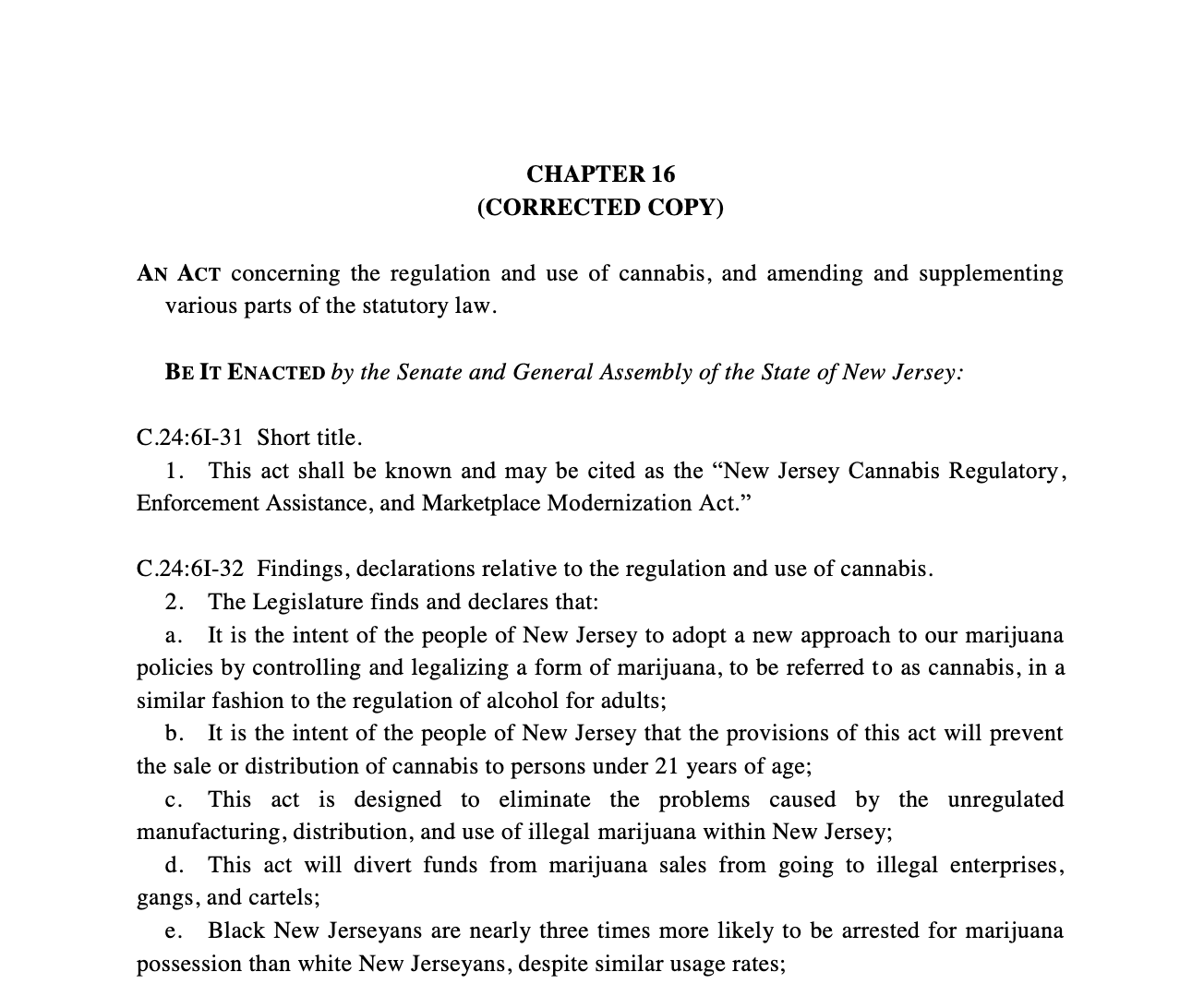Social equity in cannabis has come a long way, but lack of capital investment and pushback from municipalities can undo that
“Marijuana ganja” by Marco Beltrametti (Own work), CC BY-SA 4.0
As part of a social equity conversation presented by the Black Cannabis Equity Initiative (BCEI), New Jersey activists, cannabis lawyers and cannabis dispensary owners discussed the need for the state to invest in financial resources, technical assistance and employment and mentorship programs for people of color who want a stake in the cannabis business.
But “the state is just half the battle,” said Philmore Charles, a longtime New Jersey activist, co-founder of Black Cannabis and a shareholder in Woah Flow, New Jersey’s first black-owned cannabis dispensary. “The real battle for those that really want to be active in this space is going to be on the municipal level.”
New Jersey’s Cannabis Regulatory Commission (CRC) has made strides in social equity at the state level, although they could do more, such as low rent leases or a state Social Equity Fund similar to New York’s.
To date, one significant step is no limitation or cap requirement on cannabis businesses set by the CRC, except for cannabis cultivators, making cannabis licenses more accessible by eliminating fierce competition that pushes small businesses out of the market.
The CRC also prioritizes minorities, women, disabled veterans, people with past cannabis convictions and from economically divested areas and impact zones—areas with high rates of cannabis convictions and law enforcement activity—offering priority applications and conditional licenses.
Conditional license applications have low fees, and applicants are not required to have control of a site before applying. However, they must secure a site before their conditional license expires after 120 days or until the end of a 45-day extension granted by the CRC.
“My grave concern is that the municipalities will undo a lot of the social equity efforts that we have been fighting for,” said Jessica Gonzalez, a cannabis attorney at Hiller PC and outside General Counsel for the national organization Minorities for Medical Marijuana.
“We advocated for priority levels at the state level, we advocated for lower fees at the state level, we advocated for no caps at the state level, we advocated for no competitive licensing at the state level, yet we are seeing all four of those at stake on the municipal level,” she continued.
When it comes to low fees, application fees from the CRC at the state level don’t exceed $1,000, but municipal application fees can be as high as $10,000. These prohibitive fees can be barriers to the market.
Charles applied for local approval in Trenton and said along with the “outrageous" $10,000,” there’s another fee for receiving the license and a six-month fee on top of that.
“Which is fine and dandy. It’s going back to the city,” he said. “But the work done at the municipal level will dictate where all that money goes to.”
The compounding application and startup costs in the cannabis industry highlight the need for equitable access to capital, a hurdle for people with prior cannabis convictions and people of color who have historically been denied access to credit and investors in the mainstream marketplace, bank loans and opportunities to the same economic resources as white people.
NJ A21 "The New Jersey Cannabis Regulatory, Enforcement Assistance, and Marketplace Modernization Act," legalizing and regulating cannabis use and possession for adults 21-years-old and older, was signed into law on Feb. 22, 2021, by NJ Gov. Phil Murphy.
Even though there is a no cap rule at the state level, municipalities can enact ordinances or regulations limiting the number of cannabis establishments within their borders and ultimately decide who is in and out.
“You have now created a de facto cap on the number of licenses that can be handed out by the state,” explained Joe Johnson, the policy counsel at the American Civil Liberties Union of New Jersey (ACLU-NJ).
Municipalities are also restricting zoning for cannabis businesses, which means landlords could find themselves sitting on goldmines, accepting the highest bidder, and further minimizing licensing opportunities, especially if applicants don’t have access to capital.
If applicants don’t get site control, municipal approval and zoning approval when their license expires, their application can be denied. So, if applicants can't get site control, no acceptance at the state level will make a difference.
Suzan Nickelson is the first Black woman to operate a medical cannabis dispensary in New Jersey. She credits the CRC for trying to achieve social equity through priority applications and set sides specific to conditional licenses, such as lower fees and no site control requirement.
“As an operator of color, with the understanding of having the lack of access to capital, that is a great platform of creating a lot more diversity of black and brown operators,” she said.
But Gonzalez fears that 120 days is not enough time for conditional license applicants to secure a site, even with an extension. And with 564 municipalities in New Jersey, “it’s difficult to have any oversight over these municipalities,” she added.
In March, Gonzalez said over 80 percent of all cannabis licenses are conditional licenses, and they most likely haven’t secured a site. In April, the number of conditional licenses approved in New Jersey rose to 102.
However, municipalities in New Jersey can put local equity programs in place and ultimately decide what they want the local cannabis industry to look like, as other municipalities in other states have done, but communities must hold municipalities accountable.
"At the municipal level, we can control what these boards are doing, what the rules are, what the regulations are," said Charles. "If we're not having these conversations at the local level, they're just going to copy and paste whatever ordinance is currently active and just apply it to these impacted cities like Trenton where it makes no sense.”
"Where you have to pay taxes, as a cannabis license operator, and then still pay six figures or more just for having a license operation in the city,” he added.
In Oakland, California, Nickelson said the Cannabis Equity Program is an excellent model for municipalities in New Jersey to support businesses. The program provides financial assistance, such as initial access to capital through community grants and no-interest loans, technical assistance, legal assistance and property access.
Many municipalities and governmental agencies usually focus on poverty alleviation support instead of wealth creation, which “perpetuates the continuation of poverty,” said Phillip Woolfolk, the Chief Operations Officer at the African American Chamber of Commerce of New Jersey (AACCNJ).
But municipalities can allocate financial resources in venture capital and startups to help entrepreneurs and small businesses in the cannabis industry, Woolfolk added.
Reverend Dr. Charles Franklin Boyer, a pastor of Greater Mount Zion African Methodist Episcopal Church in Trenton, said that beyond municipalities, communities have to hold businesses accountable by looking at how they invest in people and startup businesses.
As cannabis sales begin on April 21, lawmakers in New Jersey have until the end of June to decide where cannabis tax revenue will go as they finalize the state budget, including whether they will reinvest in communities harmed by the War on Drugs by prioritizing equity and racial justice.
BCEI Director John Bailey added that a Social Equity Business Accountability Report Card is a good accountability tool.
Other states and individual communities use an accountability report card to measure a cannabis business’s relationship with black vendors, their contributions to black communities in terms of non-profits and if relatively successful business people in the community are on cannabis boards.
In California, they have a Cannabis Equity Accountability Report, which examines the health and success of cannabis social equity programs receiving state funding. Their 2021 report showed a critical need for more state oversight, and 90 percent of respondents in Oakland said a lack of capital is a significant problem.
But consumers have the power to hold businesses accountable by boycotting companies that are not investing back into the community, said Boyer. “That’s the major part, is only support entities that support you.”


